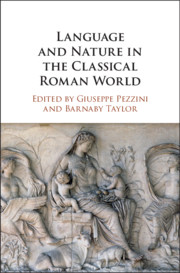Book contents
- Language and Nature in the Classical Roman World
- Language and Nature in the Classical Roman World
- Copyright page
- Contents
- Contributors
- Acknowledgements
- Abbreviations
- Introduction: First Thoughts on Language and Nature
- Chapter 1 Posidonius’ Linguistic Naturalism and Its Philosophical Pedigree
- Chapter 2 Lucilius on Latin Spelling, Grammar, and Usage
- Chapter 3 Nigidius Figulus’ Naturalism
- Chapter 4 Naturalism in Morphology
- Chapter 5 What’s Hecuba to Him?
- Chapter 6 Linguistic Naturalism in Cicero’s Academica
- Chapter 7 Linguistic Naturalism and Natural Style
- Chapter 8 Natural Law and Natural Language in the First Century BCE
- Bibliography
- Index Locorum
- Index Nominum et Rerum
Chapter 2 - Lucilius on Latin Spelling, Grammar, and Usage
Published online by Cambridge University Press: 05 June 2019
- Language and Nature in the Classical Roman World
- Language and Nature in the Classical Roman World
- Copyright page
- Contents
- Contributors
- Acknowledgements
- Abbreviations
- Introduction: First Thoughts on Language and Nature
- Chapter 1 Posidonius’ Linguistic Naturalism and Its Philosophical Pedigree
- Chapter 2 Lucilius on Latin Spelling, Grammar, and Usage
- Chapter 3 Nigidius Figulus’ Naturalism
- Chapter 4 Naturalism in Morphology
- Chapter 5 What’s Hecuba to Him?
- Chapter 6 Linguistic Naturalism in Cicero’s Academica
- Chapter 7 Linguistic Naturalism and Natural Style
- Chapter 8 Natural Law and Natural Language in the First Century BCE
- Bibliography
- Index Locorum
- Index Nominum et Rerum
Summary
The earliest pronouncements on Latin spoken and written usage come to us from a literary figure in the late second century BC, i.e. the Roman satirist Gaius Lucilius (180 / 168?–103 / 102), who had a pervasive influence on authoritative writers on Latin of the late Republic. Lucilius’ personal poetry – the first of the kind to appear on the Roman stage since Ennius’ experimental miscellaneous saturae – was characterized by an assertive voice delivering views on an unprecedented variety of themes. That language was a favourite theme is evidenced by the significant number of metalinguistic comments in the fragmentary remains of Lucilius’ notoriously large production, which included a systematic treatment (Book 9) of Latin orthography and morphology.
- Type
- Chapter
- Information
- Language and Nature in the Classical Roman World , pp. 46 - 78Publisher: Cambridge University PressPrint publication year: 2019
- 3
- Cited by

